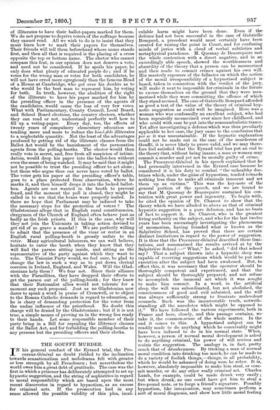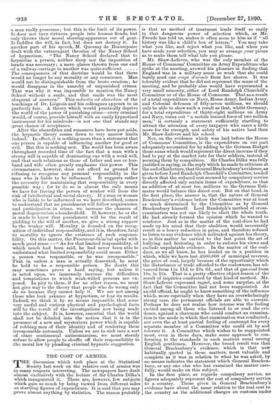THE GOIIFFE MURDER.
IN his general conduct of the Eyraud trial, the Pro- cureur-Gen6ral no doubt yielded to the inclination towards sensationalism and melodrama felt with greater or less strength by all Frenchmen ; but nevertheless the world owes him a great debt of gratitude. The case was the first in which a prisoner has deliberately attempted to set up hypnotic suggestion, and the string of sophistries in regard to moral responsibility which are based upon the most recent discoveries in regard to hypnotism, as an excuse for criminal acts. If the prosecution had in any sense allowed the possible validity of this plea, incal- culable harm might have been done. Even if the- defence had not been successful in the case of Gabrielle• Bompard, a precedent would most certainly have been created for raising the point in Court, and for confusing minds of juries with a cloud of verbal subtleties and metaphysical paradoxes. M. Quesnay de Beaurepaire met the whole contention with a direct negative, and in an• exceedingly able speech, showed the worthlessness and absurdity of the theory that a person can be mesmerised and then made to commit crimes against his own will.. His masterly exposure of the fallacies on which the notion• of the moral irresponsibility of a hypnotised subject is- based, taken in connection with the verdict of the jury, will make it next to impossible for criminals in the future to excuse themselves on the ground that they were mes- merised while they were committing the offence of which they stand accused. The case of Gabrielle Bompard afforded as good a test of the value of the theory of criminal hyp- notic suggestion as could well be imagined. Here was• a woman who was confessedly an excellent subject, who had been repeatedly mesmerised ever since her childhood, and who could with ease be put into the somnambulistic trance. Yet after investigating a defence which was thus peculiarly applicable to her case, the jury came to the conclusion that per se it was unsustainable. If the hypnotic explanation could not be made out in the case of the murderess of Gouffe, it is never likely to prove valid, and we may there- fore feel satisfied that the Eyraud trial has put an end to• the theory that, without being insane, a man or woman may commit a murder and yet not be morally guilty of crime. The Procureur-G4neral in his speech explained that he had personally intervened in the Eyraud case because he considered it is his duty to combat " the unhealthy doc- trines which, under the guise of hypnotism, tended towards nothing less than to make all criminals innocent and set them up as victims." This was the key-note of the general portion of the speech, and we are bound to- say that M. Quesnay de Beaurepaire sustained his con- tention with great power and ingenuity. To begin with, he cited the opinion of Dr. Charcot to show that the theory which we have alluded to above as that of criminal hypnotic suggestion is a pure delusion, and has no basis of fact to support it. Dr. Charcot, who is the greatest living authority on the subject, and who for the last twelve years has been unceasingly investigating the phenomena of mesmerism, having founded what is known as tire Salpetriere School, has proved that there are certain distinct limitations in regard to the power of suggestion.. It is thus that the Procureur-G6n6ral described these limi- tations, and summarised the results arrived at by the Salpetriere School :—" What," he asked, " did that school say ? That a subject thrown into a hypnotic sleep was capable of receiving suggestions which would be put into execution after the subject had been awakened. But, to effect this, it was necessary that the operator should be thoroughly competent and experienced, and that the subject should be thoroughly prepared, and not refuse to accomplish the immoral act which it was sought to make him commit. In a word, in the artificial sleep the will was subordinated, but not abolished, the consciousness of good and evil subsisted, and the will was always sufficiently strong to frustrate malevolent/ counsels. Such was the incontestable truth, notwith- standing all the anecdotes which might be opposed to it." We have followed the various experiments, both in. France and here, closely, and this passage contains, we- take it, the common-sense of the whole matter. In the• end it comes to this. A hypnotised subject can be readily made to do anything which he conceivably might have been induced to do in his normal state. When, however, a person of normal moral development is asked to do anything criminal, his power of will revives and resists the suggestion. The analogy is, in fact, pretty much that of drunkenness. By tricking a man of normal moral condition into drinking too much, he can be made to do a variety of foolish things,—things, in all probability, which he would be ashamed of doing were he sober. It is, however, absolutely impossible to make him steal, or com- mit murder, or do any other really criminal act. Charles Lamb, for example, could be made drunk very easily ; but when drunk, no one could have got him to steal a five-pound note, or to forge a friend's signature. Possibly hypnotism, like intoxication, may sometimes perform a sort of moral diagnosis, and show how little moral feeling --a man really possesses ; but this is the limit of its power. It does not turn virtuous people into human fiends, but -only throws their moral steering-apparatus out of gear. It fuddles the will, in fact, but does not destroy it. In another part of his speech, M. Quesnay de Beaurepaire -dealt with the extravagant theories of the Nancy School of hypnotism. " The Nancy School declared that to hypnotise a person, neither sleep nor the imposition of 'hands was necessary ; a mere glance thrown from one end of a. railway-carriage to another was quite sufficient ' The consequences of that doctrine would be that there -would no longer be any morality or any conscience. Man would not be distinguishable from the brute creation ; he would disappear in the anarchy of unpunished crimes. That was why it was impossible to mention the Nancy .School without a smile, and that smile was the most -eloquent of answers." This reductio ad absurdum of the teachings of Dr. Li6geois and his colleagues appears to us perfectly fair. A theory which would practically deprive the world of the power of punishing crime—every criminal -would, of course, provide himself with an easily hypnotised instrument for his misdeeds—is not one that stands any ,great chance of acceptance.
After the absurdities and romances have been put aside, the hypnotic theory comes down to very narrow limits indeed. In effect, it is nothing more than a statement that one person is capable of influencing another for good or evil. But this is nothing new. The world has been aware -throughout recorded time of the fact that a man with a strong will is capable of dominating one with a weak will, and that such relations as those of father and son or hus- band and wife often greatly emphasise this power. This circumstance, however, does not afford us ground for refusing to recognise any personal responsibility in the onan who is liable to be influenced. It suggests rather 'the necessity for maintaining that responsibility in every possible way ; for to do so is almost the only means we have for freeing the person of weaker will from the risk of intellectual and moral slavery. If a man or woman who is liable to be influenced as we have described, comes to understand that no punishment will follow acquiescence and participation in crime, we increase the chances of moral degeneration a hundredfold. If, however, he or she is made to know that punishment will be the result of yielding to the will of another, we give a strong support 'to the weaker will. Morality is founded on the recog- nition of individual responsibility, and it is, therefore, fatal to morality to ignore the existence of such responsi- bility. On this matter, the Procureur-G6n6ral spoke with much good sense :—" As for that limited responsibility, of -which much had been said, he had never been able to understand what limited responsibility could mean. Either a person was responsible, or he was irresponsible." That is, unless a man is actually demerited, he must be held to be a responsible person. No doubt this may sometimes prove a bard saying, but unless it is acted upon, we immensely increase the difficulties -and temptations to which weak-willed persons are ex- posed. In pity to them, if for no other reason, we must not give way to the theory that people who do wrong only .do so because they cannot help it. We are not among those who look askance at hypnotism, or fear its results. Indeed, we think it by no means impossible that some very useful and curious physical and psychological facts will be the result of the investigations now being made into the subject. It is, however, essential that the world -shall not be deluded into the notion that it is in the presence of a new and mysterious power which is capable of robbing men of their identity and of rendering them irresponsible automata. Unless we are to sink into a sort of crazy sentimental antinomianism, we must sternly refuse to allow people to shuffle off their responsibility to the moral law by pleading criminal hypnotic suggestion.



































 Previous page
Previous page